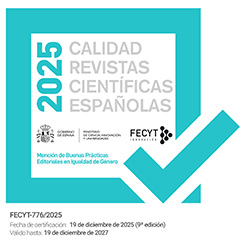Jealousy and male anxiety: articulations of gender in “the curious impertinent” and the amorous prince
Abstract
The subplot of Aphra Behn’s play The Amorous Prince is a rewriting of “The Impertinent Curious,” an interpolated tale in Don Quixote that depicts a pathologically jealous husband. All-pervasive in both Golden Age Spain and Restoration England, the discourse of jealousy was deployed to explore cultural issues involving identity and power. While contributing to validate the established relations of power, the hegemonic notions of manhood prevailing in each context were contradictory, and hence were subject to subversion and resistance. Sexual jealousy is analysed as a consequence of the paradoxes underlying the culturally specific dominant constructions of gender, which was at the same time an enabling condition of hegemony and a source of male anxiety. My analysis is aimed at determining how this ideological contradiction is managed in each text.
Downloads
References
Behn, Aphra. Plays Written by the Late Ingenious Mrs. Behn, Entire in Two Volumes. London: Printed for J. Tonson, D. Brown, J. Knapton, R. Wellington, B. Tooke, and E. Rumball, 1702.
Bray, Alan. “Homosexuality and the signs of male friendship in Elizabethan England.” History Workshop Journal 29 (1990).
https://doi.org/10.1093/hwj/29.1.1
Breitenberg, Mark. “Anxious Masculinity: Sexual Jealousy in Early Modern England.” Feminist Studies 19.2 (1993): 377-398.
https://doi.org/10.2307/3178375
---. Anxious Masculinity in Early Modern England. Cambridge: Cambridge University Press, 1996.
Burton, Robert. The Anatomy of Melancholy: What it is, with All the Kinds, Causes, Symptoms, Prognostics, and Several Cures of It. In Three Partitions; With Their Several Sections, Members, and Subsections, Philosophically, Medically, Historically Opened and Cut Up, vol. III. Ex-classics project, 2009. Web. 22 Jan. 2014.
<http://www.gutenberg.org/ebooks/10800>.
Cervantes, Miguel de. Don Quijote de La Mancha. Ed. Francisco Rico. Madrid: Punto de Lectura, 2009.
Chance, Jane. “Gender Subversion and Linguistic Castration in Fifteenth-Century English Translations of Christine de Pizan.” Violence Against Women in Medieval Texts. Ed. Anna Roberts. Gainesville: University Press of Florida, 1998. 161-194.
De Armas Wilson, Diana. “‘Passing the Love of Women’: The Intertextuality of El curioso impertinente.” Cervantes: Bulletin of the Cervantes Society of America 7.2 (1987): 9-28.
Foyster, Elizabeth A. Manhood in Early Modern England: Honour, Sex and Marriage. New York: Longman, 1999.
González-Ruiz, Julio. Amistades peligrosas: el discurso homoerótico en el teatro de Lope de Vega. New York: Peter Lang, 2009. PMid:19795907
Hughes, Derek and Janet Todd. The Cambridge Companion to Aphra Behn. Cambridge: Cambridge University Press, 2004.
https://doi.org/10.1017/CCOL0521820197
Jehenson, Yvonne. “Masochisma versus Machismo or: Camila’s Re-writing of Gender Assignations in Cervantes’s Tale of Foolish Curiosity.” Cervantes: Bulletin of the Cervantes Society of America 18.2 (1998): 26-52.
Laqueur, Thomas. Making Sex: Body and Gender from the Greeks to Freud. Massachusetts: Harvard University Press, 1990. PMid:2145819
Lee, Christina H. The anxiety of sameness in early modern Spain. Manchester: Manchester University Press, 2016.
Lehfeldt, Elizabeth A. “Ideal Men: Masculinity and Decline in Seventeenth-Century Spain.” Renaissance Quarterly 61.2 (2008): 463-494.
https://doi.org/10.1353/ren.0.0024. PMid:19227584
Montaigne, Michel. On Friendship. London: Penguin, 2004. PMid:15615242
Pearson, Jacqueline. The Prostituted Muse: Images of Women and Women Dramatists 1642-1737. New York: St. Martin’s Press, 1988.
Pepys, Samuel. The Diary of Samuel Pepys M.A. F.R.S. London: George Bell & Sons, 1893.
Pérez, Ashley H. “Into the Dark Triangle of Desire: Rivalry, Resistance, and Repression in ‘El curioso impertinente.’” Cervantes: Bulletin of the Cervantes Society of America 31.1 (2011): 83-107.
Snider, Alvin. “The Curious Impertinent on the Restoration Stage.” The Seventeenth Century 21.2 (2006): 315-334.
Stallybrass, Peter. “Patriarchal Territories: The Body Enclosed.”Rewriting the Renaissance: The Discourses of Sexual Difference in Early Modern Europe. Ed. Margaret W. Ferguson, Maureen Quilligan, and Nancy J. Vickers. Chicago: University of Chicago Press (1986): 123-44.
Taylor, Scott K. Honor and Violence in Golden Age Spain. New Haven: Yale University Press, 2008.
https://doi.org/10.12987/yale/9780300126853.001.0001
Villalobos, Francisco. Curiosidades bibliográficas. Biblioteca de Autores Españoles 36. Madrid: Atlas, 1950. PMid:17739700
Downloads
Published
Issue
Section
License
Authors who publish with this journal agree to retain copyright and grant the journal right of first publication with the work simultaneously licensed under a Creative Commons Attribution License that allows others to share the work with an acknowledgement of the work's authorship and initial publication in this journal. Also, authors will retain the rights on their work, even if they will be granting The Grove. Working Papers on English Studies a non-exclusive right of use to reproduce, edit, distribute, publicly communicate and show their work. Therefore, authors are free to engage in additional, independent contracts for non-exclusive distribution of the works published in this journal (such as uploading them to an institutional repository or publishing them in a book), as long as the fact that the manuscripts were first published in this journal is acknowledged.

























